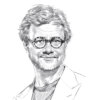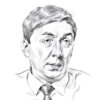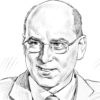

Karol NAWROCKI
 Poland as a stabilising force
Poland as a stabilising force
The history of the 20th century is clear – the greatest atrocities were committed in Europe when Poland was not on the map.

Prof. Dana GOOLEY
 The Great Improviser
The Great Improviser
Fryderyk Chopin’s true fatherland is the dream world of poetry – writes Prof. Dana GOOLEY.

Aleksander LASKOWSKI
 Krzysztof Penderecki. Sacrum and avant-garde
Krzysztof Penderecki. Sacrum and avant-garde
By creating sacral works and presenting them in communist Poland, Krzysztof Penderecki became actively involved in the social and political movements that resulted in the overthrow of communism

Prof. Zbigniew STAWROWSKI
 The Rule of Law as a European Value. The Philosophical Context of the Prevailing Political Dispute
The Rule of Law as a European Value. The Philosophical Context of the Prevailing Political Dispute
Zbigniew STAWROWSKI: The Rule of Law as a European Value The Philosophical Context of the Prevailing Political Dispute

Prof. Arkady RZEGOCKI
 What is Poland? A country of freedom and solidarity
What is Poland? A country of freedom and solidarity
According to Gilbert Chesterton, the enemies of Poland almost always turn out to be also the enemies of magnanimity, valour and freedom. Paraphrasing this thought, we can say that the friends of Poland are almost always the enemies of tyranny, and the friends of freedom and solidarity.

Karol NAWROCKI
 Guardians of foreign interests
Guardians of foreign interests
This September marks the 30th anniversary of the landmark event when the post-Soviet Russian forces withdrew from Polish territory. The long period of the foreign army protecting Moscow’s interests in our country came to an end. Its continued presence on our soil resulted from the enslavement that Poles associate with the outbreak of war and the Soviet invasion of 17 September 1939.

Jan PARYS
 What made the Russian army withdraw from Poland thirty years ago?
What made the Russian army withdraw from Poland thirty years ago?
Thirty years ago, Russia pulled over 60,000 troops, 200 aircraft, 200 tanks, 700 armoured vehicles and 20 operational-tactical missile launchers out of Poland. Nuclear missiles, including around 300 warheads, were also deployed in Poland.

Prof. Marek KORNAT
 Why did Russian troops leave Poland as late as in 1993, not in 1989?
Why did Russian troops leave Poland as late as in 1993, not in 1989?
As long as Russian troops stationed on the Polish territory, Poland was a country aspiring to independence, but not yet independent.

Łukasz KAMIŃSKI
 The Prague Spring of 1968. The consequences of the invasion in Autumn
The Prague Spring of 1968. The consequences of the invasion in Autumn
We usually treat the Prague Spring and its military suppression as an episode in the history of the Cold War. In fact, which might seem surprising from today’s perspective, the intervention of the Warsaw Pact troops did not affect the process initiated still before 1968 of détente in the relations between the East and the West.

Nathaniel GARSTECKA
 Western myths about Poland. Did Poland and Poles massively collaborate with the Germans?
Western myths about Poland. Did Poland and Poles massively collaborate with the Germans?
’The myth that Poland and Poles actively and massively participated in the Holocaust should be treated in the same way as the myth of Judeo-Bolshevism – as a manipulation aimed at shifting responsibility for the crimes onto someone else,’ writes Nathaniel GARSTECKA

Prof. Jeffrey SONNENFELD
 Poland was right. Today you are a model for others
Poland was right. Today you are a model for others
Poland’s early warnings to the rest of Europe on the dangers of depending on Russian gas were not believed until it was too late.

Mateusz SZPYTMA
 The fate of the Ulma family. And the the hidden Jewish families the Goldmans, the Didners and the Grünfelds Jews concealed by them
The fate of the Ulma family. And the the hidden Jewish families the Goldmans, the Didners and the Grünfelds Jews concealed by them
It would be difficult to determine the Ulmas’ motives for inviting Jews into their home – writes Mateusz Szpytma.

Andrzej DUDA
 The story of the Ulmas’ martyrdom should be known worldwide
The story of the Ulmas’ martyrdom should be known worldwide
As Poles, we are proud that on 10 September 2023, the Ulma family, our compatriots, will be added to the ranks of the Blessed of the Catholic Church.

Prof. Piotr GLIŃSKI
 Remembering is our duty
Remembering is our duty
On the morning of 1 September 1939, German planes dropped bombs that obliterated the All Saints’ Hospital in Wieluń, followed by a substantial portion of the town – a place with no strategic value, whose demolition marked the initiation of World War II.

Jan ROKITA
 Murdered for human kindness
Murdered for human kindness
By law, every Jew in German-occupied Poland had to be handed over to the German authorities. Breaking this law meant a death sentence for the entire family.

Abp Stanisław GĄDECKI
 Polonia semper fidelis – a special mission of faithfulness
Polonia semper fidelis – a special mission of faithfulness
The beatification of the Polish family of Ulmas from Markowa village in southern Poland has a symbolic dimension.

Monika KRAWCZYK
 The Ulmas could have 18 grandchildren and 36 great-grandchildren. So could the Goldmans, to whom they gave shelter
The Ulmas could have 18 grandchildren and 36 great-grandchildren. So could the Goldmans, to whom they gave shelter
The Germans proclaimed: ‘Jews who leave their assigned district without permission are subject to the death penalty. Anyone who knowingly gives shelter to escaped Jews will be subject to the same punishment.’

Karol NAWROCKI
 Martyrdom is Testimony
Martyrdom is Testimony
The German occupation and the monstrous design of the Holocaust was a clash with a ‘civilization of death’ for everyone in Poland, especially Jews. The plan was to wipe out an entire group of people and take control of the captured lands while dividing humanity into a dominant master race and completely dependent subhumans. Thus, in those horrific times, another, even more terrifying and dark war was waged alongside the one on the frontlines – a war against humanity. Many heroes were ready to make the ultimate sacrifice to defend it, despite the prevalent degradation. A lot of them remain unnamed, their bravery known only to Providence. The sacrifice of others, such as the martyrdom of the Ulma family from Markowa, can serve as a testimony.

Mateusz SZPYTMA
 What makes the Ulma family special?
What makes the Ulma family special?
The Ulma family could become a symbol of international significance, just like Rotmistrz Witold Pilecki or Jan Karski.

Abp Adam SZAL
 The Ulma Family – a Sign of Times for the Modern World
The Ulma Family – a Sign of Times for the Modern World
Ulma family are an inspiration for contemporary man to remain open to the community and to the role of a family defined as a union of man and woman.



















